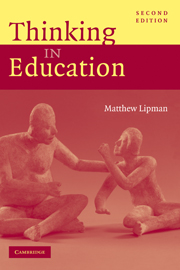Book contents
- Frontmatter
- Contents
- Preface
- Introduction to the Second Edition
- PART ONE EDUCATION FOR THINKING
- PART TWO COMMUNITIES OF INQUIRY
- 4 Thinking in Community
- 5 The Community of Inquiry Approach to Violence Reduction
- PART THREE ORCHESTRATING THE COMPONENTS
- PART FOUR EDUCATION FOR THE IMPROVEMENT OF THINKING
- Bibliography
- Index
4 - Thinking in Community
Published online by Cambridge University Press: 05 June 2012
- Frontmatter
- Contents
- Preface
- Introduction to the Second Edition
- PART ONE EDUCATION FOR THINKING
- PART TWO COMMUNITIES OF INQUIRY
- 4 Thinking in Community
- 5 The Community of Inquiry Approach to Violence Reduction
- PART THREE ORCHESTRATING THE COMPONENTS
- PART FOUR EDUCATION FOR THE IMPROVEMENT OF THINKING
- Bibliography
- Index
Summary
WHAT PRODUCES THE COMMUNITY AND WHAT THE COMMUNITY PRODUCES
All inquiry is self-critical practice, and all of it is exploratory and inquisitive. Some aspects of inquiry are more experimental than others. And inquiry is generally social or communal in nature because it rests on a foundation of language, of scientific operations, of symbolic systems, of measurements and so on, all of which are uncompromisingly social.
But while all inquiry may be predicated upon community, it does not follow that all community is predicated upon inquiry. There is nothing self-contradictory in the notion of a fixated, tradition-bound community. The glue that holds a community together is practice, but it does not have to be self-critical practice.
Thus, there is something paradoxical, something faintly startling, about the notion of a community of inquiry; it unites two concepts that are not ordinarily found together or juxtaposed. This makes it all the more surprising that so unconventional a notion should be proposed as a master educational paradigm.
Consider at this point some of its features. First I think we need to see that the community of inquiry is not aimless. It is a process that aims at producing a product – at some kind of settlement or judgment, however partial and tentative this may be. Second, the process has a sense of direction; it moves where the argument takes it. Third, the process is not merely conversation or discussion; it is dialogical. This means it has a structure.
Information
- Type
- Chapter
- Information
- Thinking in Education , pp. 83 - 104Publisher: Cambridge University PressPrint publication year: 2003
